Posts (page 26)
-
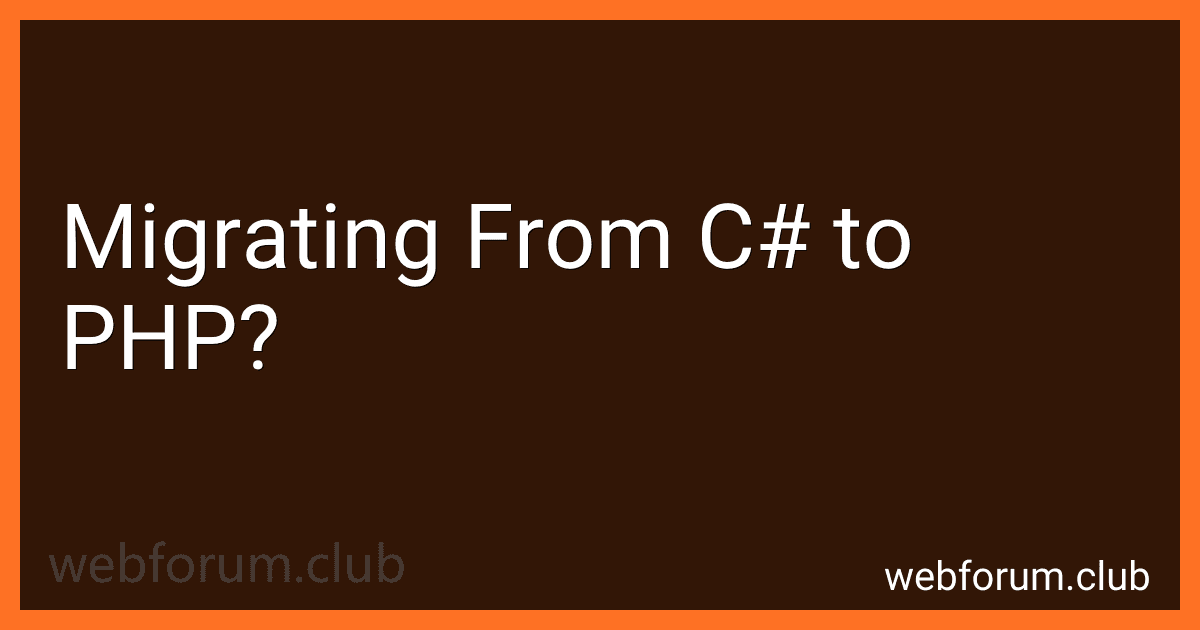 6 min readMigrating from C# to PHP involves transitioning from one programming language to another. C# is a statically typed, object-oriented language primarily used for building applications on the Microsoft .NET framework, while PHP is a dynamic, server-side scripting language commonly used for web development.When migrating from C# to PHP, there are several key differences to consider:Syntax: The syntax of C# and PHP differ significantly.
6 min readMigrating from C# to PHP involves transitioning from one programming language to another. C# is a statically typed, object-oriented language primarily used for building applications on the Microsoft .NET framework, while PHP is a dynamic, server-side scripting language commonly used for web development.When migrating from C# to PHP, there are several key differences to consider:Syntax: The syntax of C# and PHP differ significantly.
-
 7 min readMigrating from PHP to Go is a process of transitioning an application or project written in PHP, a server-side scripting language, to Go, a statically typed, compiled language developed by Google. This migration is usually undertaken to leverage the benefits of Go, such as better performance, scalability, and ease of use for concurrent programming.One major difference between PHP and Go is their execution model.
7 min readMigrating from PHP to Go is a process of transitioning an application or project written in PHP, a server-side scripting language, to Go, a statically typed, compiled language developed by Google. This migration is usually undertaken to leverage the benefits of Go, such as better performance, scalability, and ease of use for concurrent programming.One major difference between PHP and Go is their execution model.
-
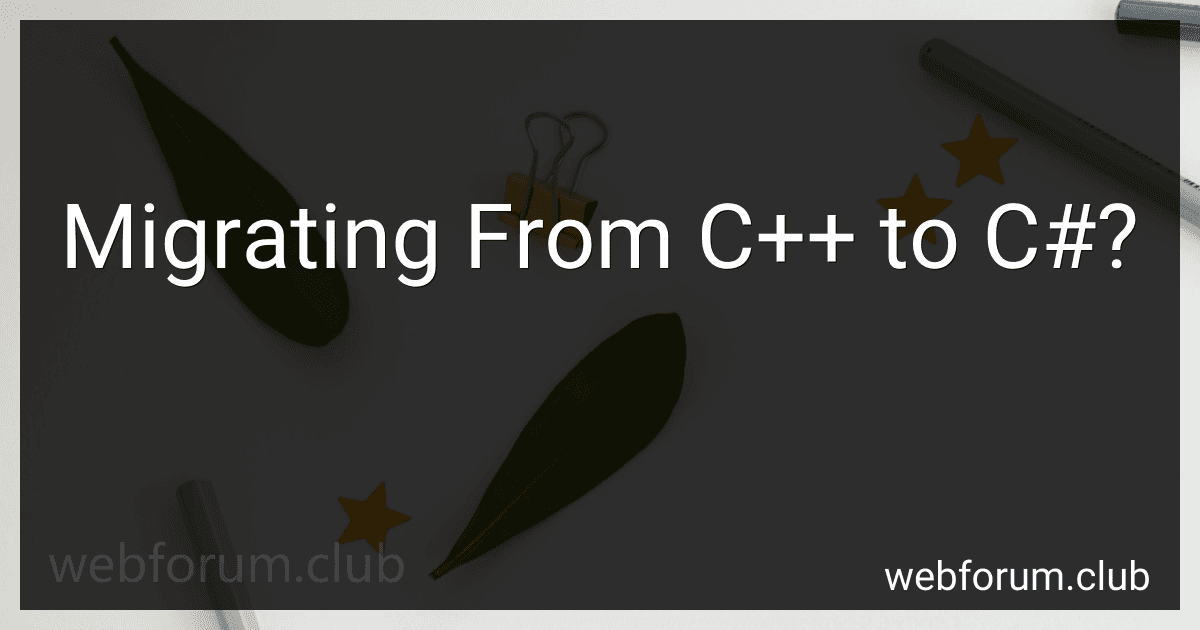 9 min readWhen considering migrating from C++ to C#, there are several important aspects to consider.Syntax Differences: C++ and C# have different syntaxes. C++ is a low-level language with object-oriented features, whereas C# is a higher-level language also based on object-oriented programming. The syntax in C# is generally considered more concise and straightforward compared to C++.
9 min readWhen considering migrating from C++ to C#, there are several important aspects to consider.Syntax Differences: C++ and C# have different syntaxes. C++ is a low-level language with object-oriented features, whereas C# is a higher-level language also based on object-oriented programming. The syntax in C# is generally considered more concise and straightforward compared to C++.
-
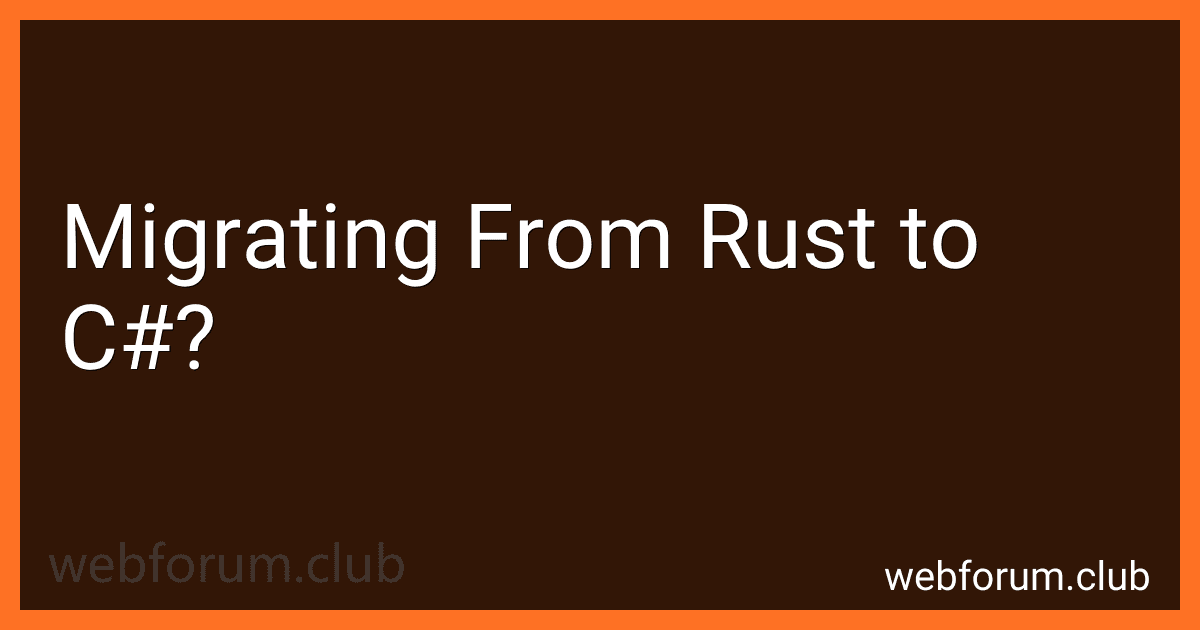 11 min readMigrating from Rust to C# involves transitioning from a programming language known for its memory safety and high-level abstractions to a language that offers more flexibility and closer integration with the Windows ecosystem.Rust, known for its focus on safety, concurrency, and performance, is particularly popular for systems programming and developing low-level applications.
11 min readMigrating from Rust to C# involves transitioning from a programming language known for its memory safety and high-level abstractions to a language that offers more flexibility and closer integration with the Windows ecosystem.Rust, known for its focus on safety, concurrency, and performance, is particularly popular for systems programming and developing low-level applications.
-
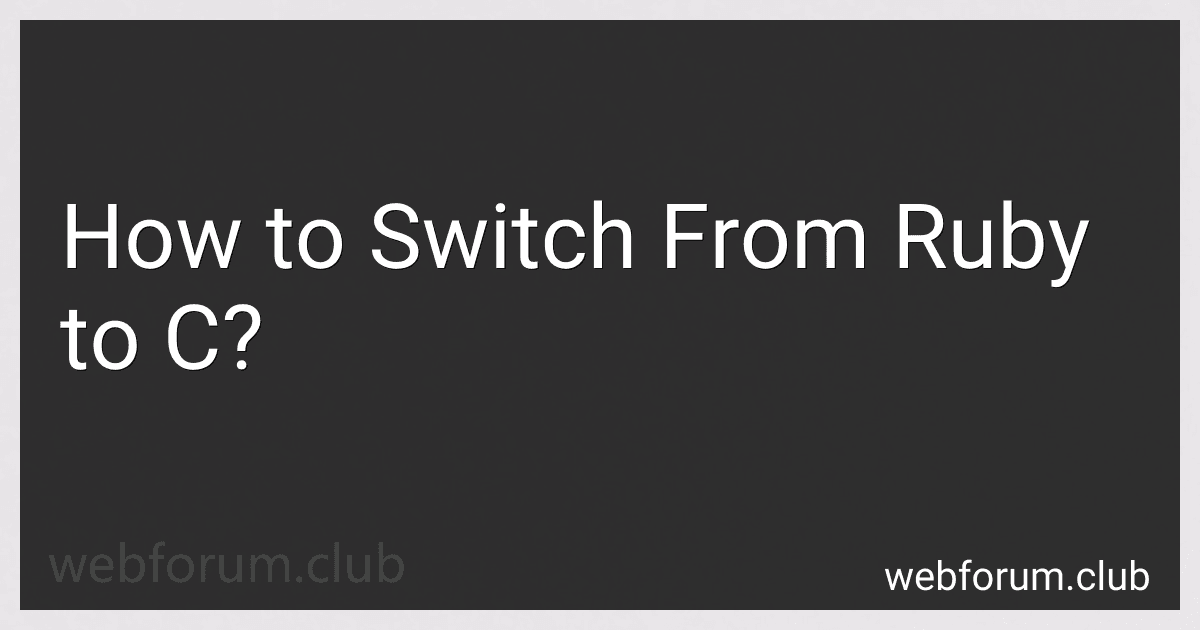 9 min readSwitching from Ruby to C can be a challenging but rewarding transition. While Ruby is an interpreted scripting language known for its simplicity and readability, C is a low-level language that provides more control and efficiency. Here are some key points to keep in mind when making the switch:Syntax: The syntax of C is significantly different from Ruby. C is a statically-typed language, meaning you need to declare the types of variables in advance.
9 min readSwitching from Ruby to C can be a challenging but rewarding transition. While Ruby is an interpreted scripting language known for its simplicity and readability, C is a low-level language that provides more control and efficiency. Here are some key points to keep in mind when making the switch:Syntax: The syntax of C is significantly different from Ruby. C is a statically-typed language, meaning you need to declare the types of variables in advance.
-
 7 min readTransitioning from C++ to Python involves moving from a statically-typed compiled language to a dynamically-typed interpreted one. Python is known for its simple and readable syntax, making it easier to learn and write code. Here are some key points to consider during the transition:Syntax Differences: Python uses indentation to define code blocks rather than curly braces, and it does not require complex header files and type declarations like C++.
7 min readTransitioning from C++ to Python involves moving from a statically-typed compiled language to a dynamically-typed interpreted one. Python is known for its simple and readable syntax, making it easier to learn and write code. Here are some key points to consider during the transition:Syntax Differences: Python uses indentation to define code blocks rather than curly braces, and it does not require complex header files and type declarations like C++.
-
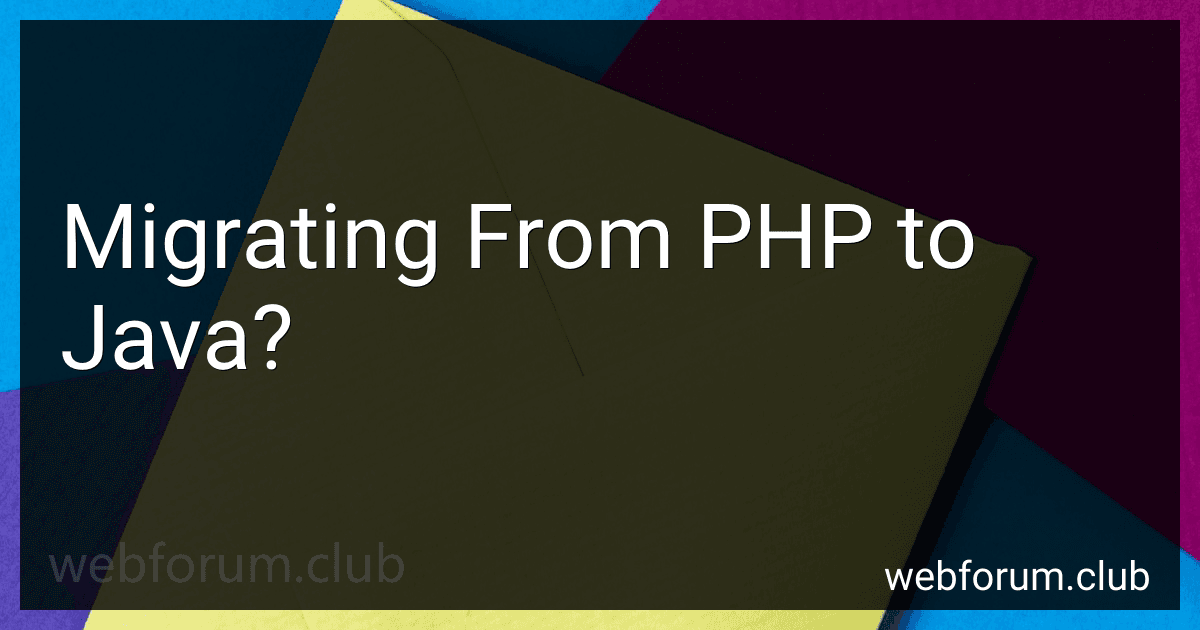 9 min readMigrating from PHP to Java is a process of porting an existing application written in PHP to Java programming language. While both PHP and Java are popular programming languages for building web applications, migrating from PHP to Java may be necessary due to various reasons such as scalability, performance, maintainability, or the need to leverage specific Java libraries or frameworks.One of the key differences between PHP and Java is their execution models.
9 min readMigrating from PHP to Java is a process of porting an existing application written in PHP to Java programming language. While both PHP and Java are popular programming languages for building web applications, migrating from PHP to Java may be necessary due to various reasons such as scalability, performance, maintainability, or the need to leverage specific Java libraries or frameworks.One of the key differences between PHP and Java is their execution models.
-
 8 min readTo switch from Go to Python, follow these steps:Understand the basics: Familiarize yourself with Python's syntax, data types, control flow statements, functions, and object-oriented programming concepts. Python is a high-level, interpreted language known for its simplicity and readability. Set up the development environment: Install the latest version of Python on your system. You can download Python from the official website.
8 min readTo switch from Go to Python, follow these steps:Understand the basics: Familiarize yourself with Python's syntax, data types, control flow statements, functions, and object-oriented programming concepts. Python is a high-level, interpreted language known for its simplicity and readability. Set up the development environment: Install the latest version of Python on your system. You can download Python from the official website.
-
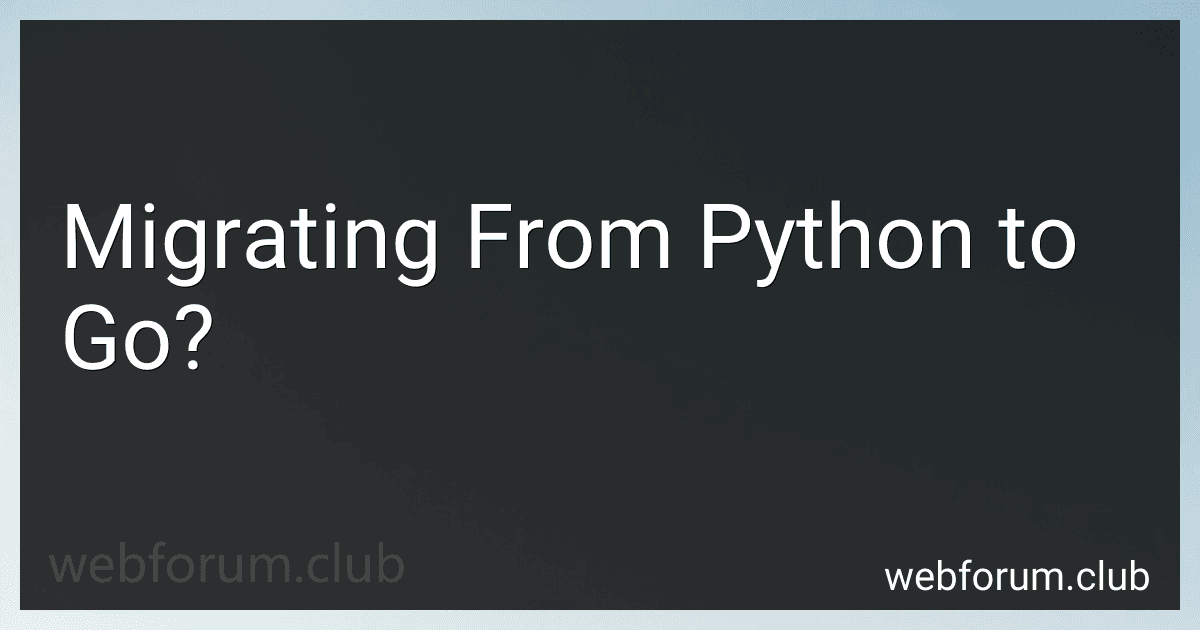 8 min readMigrating from Python to Go is a process of transitioning a codebase or application from using Python as the programming language to using Go. This migration is usually done to take advantage of Go's benefits such as better performance, concurrency support, and static typing.The migration process typically involves the following steps:Understanding Go: Developers need to familiarize themselves with the syntax, features, and idioms of the Go programming language.
8 min readMigrating from Python to Go is a process of transitioning a codebase or application from using Python as the programming language to using Go. This migration is usually done to take advantage of Go's benefits such as better performance, concurrency support, and static typing.The migration process typically involves the following steps:Understanding Go: Developers need to familiarize themselves with the syntax, features, and idioms of the Go programming language.
-
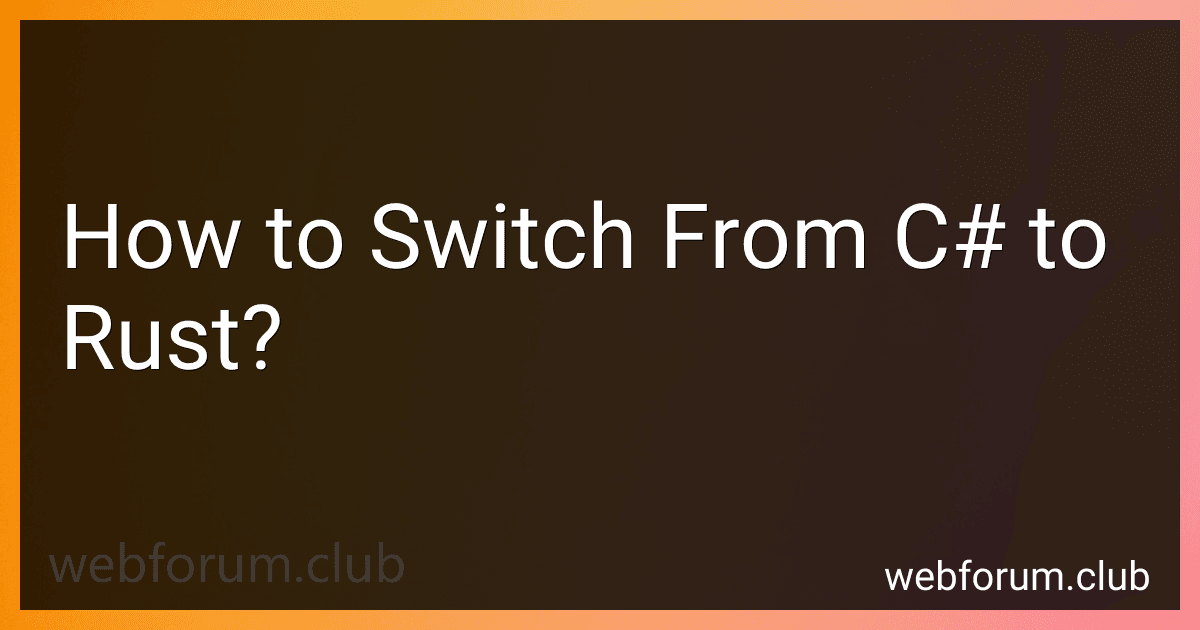 8 min readSwitching from C# to Rust involves learning a new programming language and understanding its syntax and concepts. Here is an overview of the process:Start by familiarizing yourself with Rust's syntax: Rust has a different syntax compared to C#. Take some time to go through the official Rust documentation to understand the language's unique features, such as its ownership and borrowing system.
8 min readSwitching from C# to Rust involves learning a new programming language and understanding its syntax and concepts. Here is an overview of the process:Start by familiarizing yourself with Rust's syntax: Rust has a different syntax compared to C#. Take some time to go through the official Rust documentation to understand the language's unique features, such as its ownership and borrowing system.
-
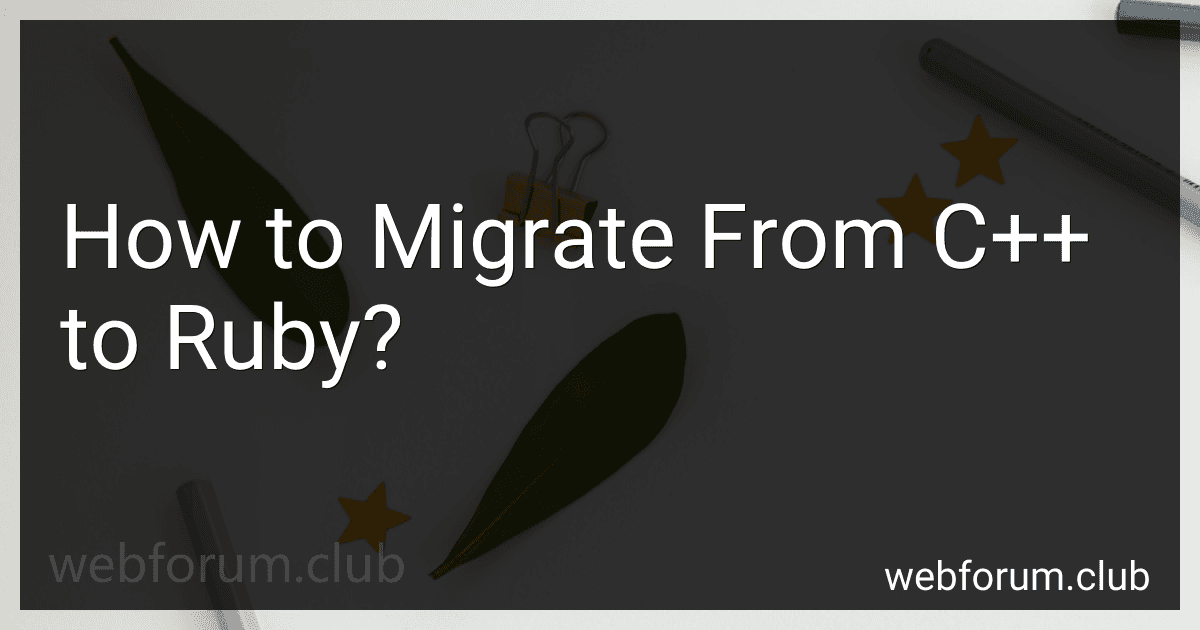 5 min readMigrating from C++ to Ruby requires understanding the differences in syntax, structure, and programming paradigms between the two languages. Here are some key points to consider during the migration process:Syntax Differences: Ruby has a more concise and expressive syntax compared to C++. It employs dynamic typing, meaning that variables are not explicitly declared with a specific type. Additionally, Ruby uses indentation to define code blocks instead of braces.
5 min readMigrating from C++ to Ruby requires understanding the differences in syntax, structure, and programming paradigms between the two languages. Here are some key points to consider during the migration process:Syntax Differences: Ruby has a more concise and expressive syntax compared to C++. It employs dynamic typing, meaning that variables are not explicitly declared with a specific type. Additionally, Ruby uses indentation to define code blocks instead of braces.
-
 8 min readMigrating from Java to Java refers to the process of transferring or updating existing Java applications or projects to a different version of the Java platform. This could involve moving from an older version to a newer one, or transitioning from one implementation of Java (such as Oracle's JDK) to another (like OpenJDK).There can be several reasons for migrating Java codebases.
8 min readMigrating from Java to Java refers to the process of transferring or updating existing Java applications or projects to a different version of the Java platform. This could involve moving from an older version to a newer one, or transitioning from one implementation of Java (such as Oracle's JDK) to another (like OpenJDK).There can be several reasons for migrating Java codebases.